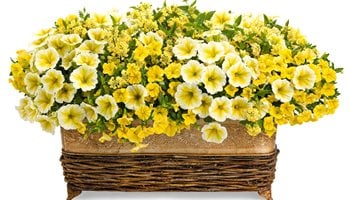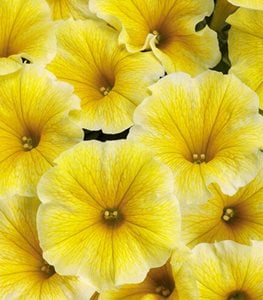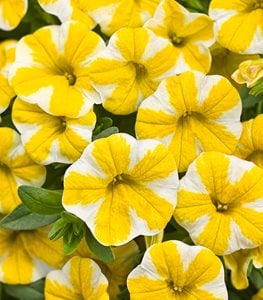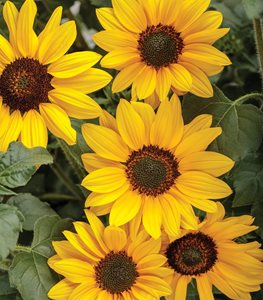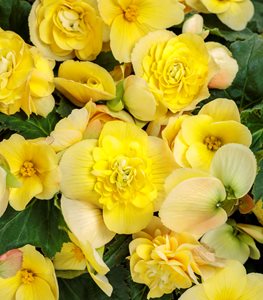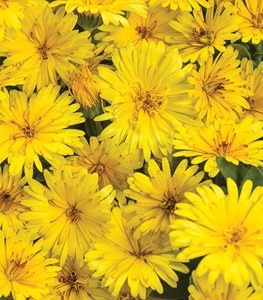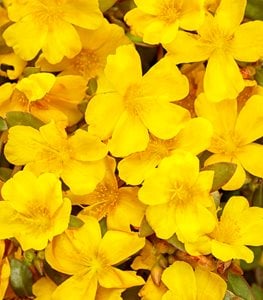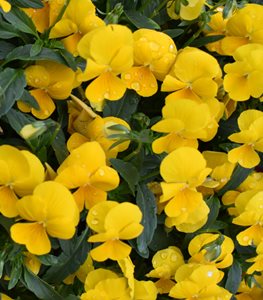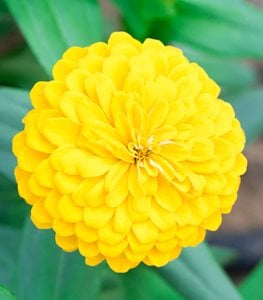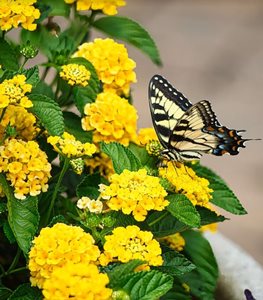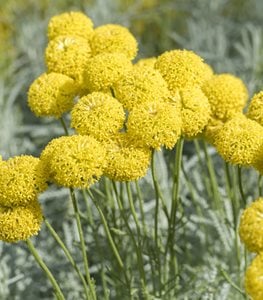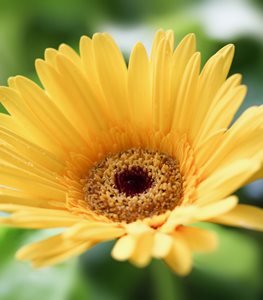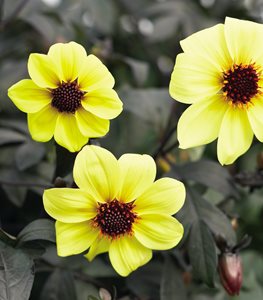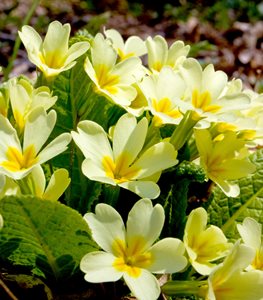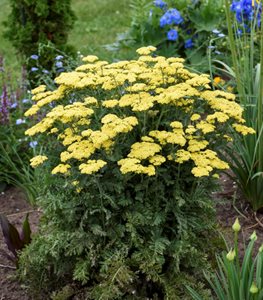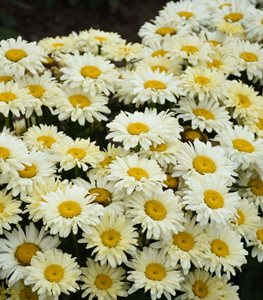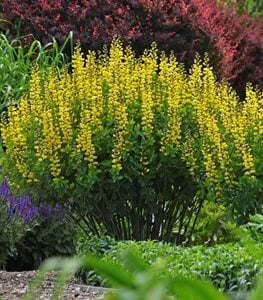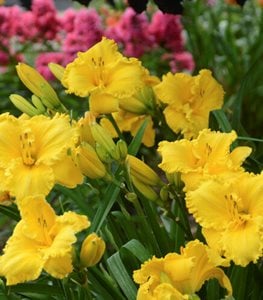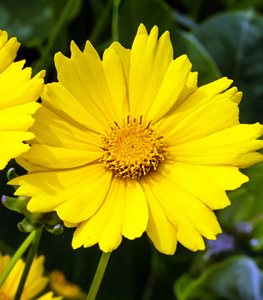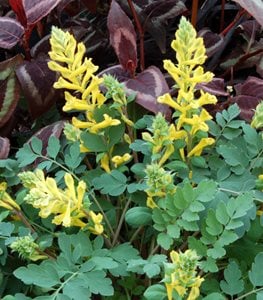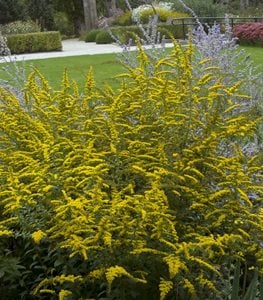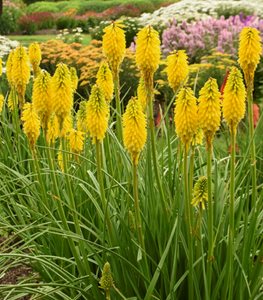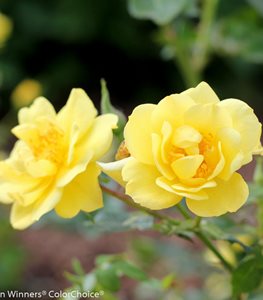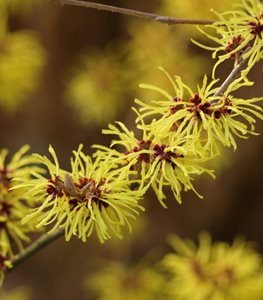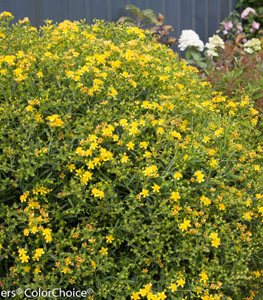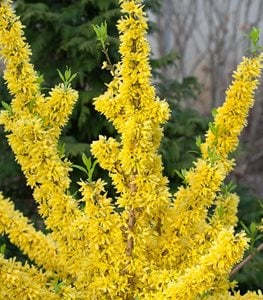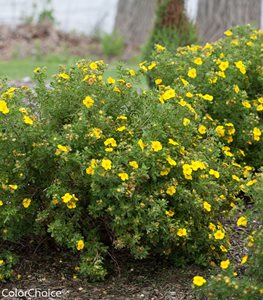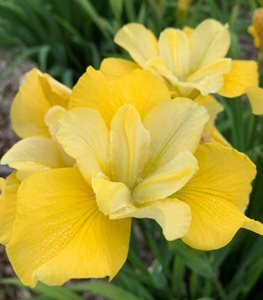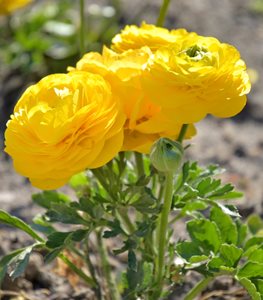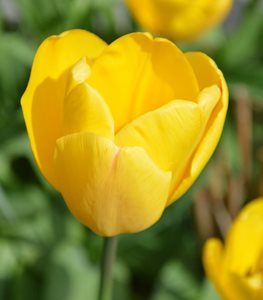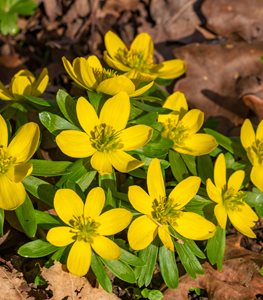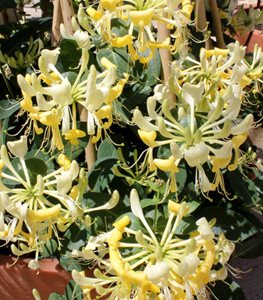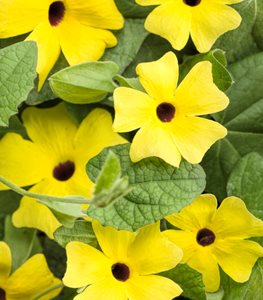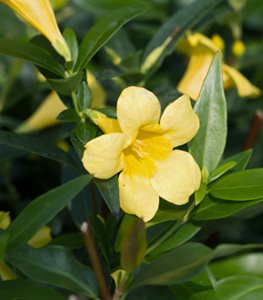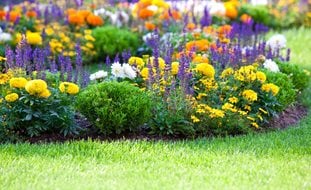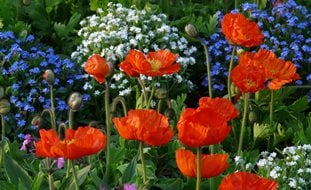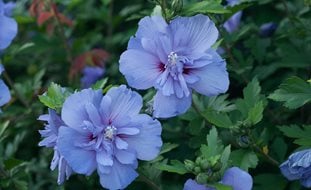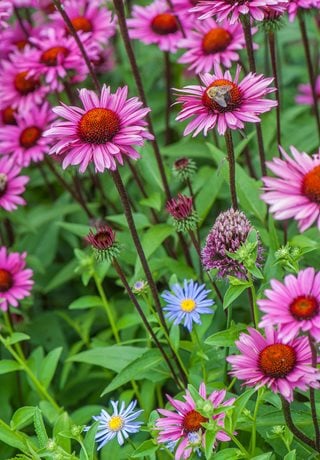The Prettiest Yellow Flowers for Your Garden
Bring a little sunshine to every corner of your garden with these 34 flowering annuals, perennials, bulbs, shrubs, and vines. Published: 7/6/2022Who doesn’t love yellow flowers? Bright and cheery as a sunny day, they make every season joyful, from early spring (think yellow daffodils and tulips) through late fall and even winter in some climates (try witch hazel or winter aconite). They come in a vast array of shades, too, from soft and buttery to bold and vibrant, making them versatile enough to complement any color scheme.
Browse through this list to find the perfect yellow flowers to brighten up your garden.
On this page: Annuals | Perennials | Shrubs | Bulbs | Vines | Design Tips
On this page:
ANNUALS WITH YELLOW FLOWERS
PETUNIA
Supertunia® Saffron Finch™ petunia —
(Petunia hybrid)
Bloom time: From planting until frost
Height/Spread: 6 to 10 inches tall, trailing up to 2 feet
This sunny yellow Supertunia® has a full well-branched, rounded habit, and is excellent as a filler or spiller plant in hanging baskets and window boxes or used at the front of a garden bed to create a bright yellow border. Will bloom continuously even without deadheading. Learn more about growing petunias.
CALIBRACHOA
Superbells® Lemon Slice® calibrachoa —
(Calibrachoa hybrid)
Bloom time: From planting until frost
Height/Spread: 6 to 12 inches tall, spreading up to 2 feet
A striking pinwheel pattern makes these petite, petunia-like blooms pop in container plantings or garden beds. For even greater impact, try pairing them with deep purple petunias or blue nemesia. Learn more about growing calibrachoa.
SUNFLOWER
Suncredible® Yellow sunflower —
(Helianthus hybrid)
Bloom time: Late spring until frost
Height/Spread: 24 to 36 inches tall, 20 to 32 inches wide
This compact sunflower blooms longer than other types, giving you a continuous supply of cheery golden-yellow flowers that are great for cutting. Attractive to bees, butterflies and birds, sunflowers are also a sure-fire way to lure local wildlife to your garden. Learn more about growing sunflowers.
BEGONIA
Double Delight® Primrose begonia —
(Begonia tuberhybrida)
Bloom time: From planting until frost
Height/Spread: 8 to 14 inches tall, trailing up to 2 feet
Produces large, fragrant flowers that blossom in shades of soft yellow and apricot throughout the summer. Although tuberous begonias are not cold hardy, you can dig up the tubers at the first threat of frost and replant them the following spring. Learn more about growing and caring for begonias.
POT MARIGOLD
Lady Godiva® Yellow pot marigold —
(Calendula hybrid)
Bloom time: Spring until hard frost
Height/Spread: 10 to 16 inches tall, 12 to 18 inches wide
Sporting fully double, bright yellow blooms, this charming pot marigold brings a sunny presence to garden borders and container plantings. The flowers are edible, too, and can be used to garnish salads and other dishes.
PORTULACA
Mojave® Yellow portulaca —
(Portulaca sp.)
Bloom time: Summer until frost
Height/Spread: 3 to 12 inches tall, 6 to 24 inches wide
Also known as moss rose because of its low-growing habit and rose-like flowers, this colorful succulent comes in a wide assortment of bold, bright hues, including various shades of yellow and mixed colors. Plant in any sunny spot where you need a fast-growing, drought-tolerant groundcover. Learn more about growing moss rose plants.
PANSY
(Viola x wittrockiana) Exposure: Full sunBloom time: Spring, fall, early winter
Height/Spread: 3 to 12 inches tall, 6 to 24 inches wide
This popular cool-season grower comes in a multitude of colors, but yellow-flowering varieties are among the most versatile. You can choose from solid shades as well as blended patterns that look just as good in the spring garden as they do in the fall. See our guide to growing perfect pansies.
ZINNIA
(Zinnia spp.) Exposure: Full sunBloom time: Late spring until frost
Height/Spread: 1 to 4 feet tall, 1 to 2 feet wide
Zinnia flowers come in almost as many shapes as they do colors, including several varieties with fully double yellow blossoms. They are great for cutting, too, and will bloom even more if you harvest them regularly. For a match made in heaven, combine yellow zinnias with purple verbena or ornamental salvia. Learn more about growing zinnias.
LANTANA
Luscious® Royale Lemon Tart™ —
(Lantana camara)
Bloom time: From planting until hard frost
Height/Spread: 20 to 30 inches tall and wide
Heat and drought conditions are no match for this carefree bloomer, which will reward you with clusters of bright yellow flowers all summer long, even without deadheading. Lantana flowers are also rich in nectar, making them irresistible to butterflies, hummingbirds, and other pollinators. Learn more about how to grow lantana plants.
BILLY BUTTONS
(Craspedia globosa) Exposure: Full sunBloom time: Summer
Height: 24 to 30 inches tall
Also called drumsticks or sun balls, these whimsical mustard-yellow flowers can reach the size of golf balls and are often used in cut flower arrangements because of their unique form and long-lasting blooms. Although typically grown as an annual, this tough, drought-tolerant plant is perennial in zones 8-11, where it will bloom most of the year.
GERBERA DAISY
(Gerbera jamesonii) Exposure: Full sunBloom time: Late spring through fall
Height: 8 to 12 inches tall and wide
Few things are cheerier than a bouquet of gerbera daisies, and it’s easy to grow your own blooms for cutting, in yellow and many other mood-lifting colors. The large flower heads can grow up to 6 inches across and come in a variety of forms including single, semi-double, and double-petaled types. Learn more about growing gerbera daisies.
DAHLIA
‘Mystic Illusion’ dahlia —
(Dahlia hybrid)
Bloom time: Mid-summer until frost
Height/Spread: 18 to 36 inches tall, 12 to 16 inches wide
Dahlias are prized for their spectacular, long-lasting blooms and endless variety in color and form. Although often treated as annuals, dahlias grow from tubers that can be dug up and stored for replanting the following spring. In frost-free climates, the tubers can stay in the ground and will rebloom year after year. Learn more about growing dahlia flowers.
PERENNIALS WITH YELLOW FLOWERS
PRIMROSE
(Primula spp.) Zones: Typically 3-8, but varies by speciesExposure: Part shade to full sun
Bloom time: Early to late spring
Height: 6 to 8 inches tall, 8 to 20 inches wide
Primroses love cool temperatures and are often one of the first flowers to emerge in spring. In addition to yellow, they also bloom in vibrant shades of red, purple, pink, blue, and various bicolors. In warm climates, where primroses won’t survive the summer heat, you can treat them as annuals and plant them each fall for late winter or early spring bloom. Learn more about growing primrose flowers.
YARROW
‘Firefly Sunshine’ yarrow —
(Achillea hybrid)
Exposure: Full sun
Bloom time: Early to late summer
Height/Spread: 28 to 30 inches tall, 24 to 28 inches wide
This cottage garden favorite produces blooms all summer long while tolerating heat and drought like a champ. When the flowers begin to fade, a light trim will encourage additional blooms. For a beautiful pairing, plant yellow yarrow with purple catmint, another tough-as-nails perennial with long-lasting summer flowers. See more great yarrow plants for heating up the summer garden.
SHASTA DAISY
Amazing Daisies® ‘Banana Cream’ Shasta daisy —
(Leucanthemum superbum)
Exposure: Full sun
Bloom time: Early to late summer
Height/Spread: 15 to 18 inches tall, 18 to 24 inches wide
Unlike the traditional bright white shasta daisy, this unique variety starts out with pretty lemon-yellow blooms that gradually fade to creamy white as the flowers mature. The huge blooms measure up to 5 inches across and feature extra ray petals for extra fullness. Learn more about growing shasta daisies.
BAPTISIA
Decadence® ‘Lemon Meringue’ false indigo —
(Baptisia hybrid)
Exposure: Partial to full sun
Bloom time: Late spring to early summer
Height/Spread: 3 feet tall and wide
Bred for its compact size, this sturdy native false indigo produces elegant spikes of pale yellow flowers that last for weeks in early summer. After the blooms fade, attractive blue-green foliage and dark charcoal-colored stems continue to add interest the rest of the season. Learn more about growing false indigo.
DAYLILY
'Erin Lea' daylily —
(Hemerocallis hybrid)
Exposure: Partial to full sun
Bloom time: Early summer to early fall
Height/Spread: 18 to 24 inches tall and wide
Cheerful yellow flowers bloom profusely in early to mid-summer and then continue reblooming well into fall, filling garden beds and borders with long-lasting color and fragrance. Will grow in most soil types, from sand to clay. Learn more about growing daylilies.
COREOPSIS
(Coreopsis spp.) Zones: 4-9Exposure: Full sun
Bloom time: Early to late summer
Height/Spread: 6 inches (dwarf forms) to 8 feet tall
Also known as tickseed, this stunning native prairie plant blooms prolifically all summer long, in brilliant shades of yellow and gold. Some varieties also have delicate, lacy foliage that adds nice textural contrast to garden beds and container plantings. Learn more about growing coreopsis.
CORYDALIS
'Canary Feathers' corydalis —
(Corydalis hybrid)
Exposure: Partial to full shade
Bloom time: Late spring through fall
Height/Spread: 9 to 12 inches tall and wide
If you’re looking for a long-blooming yellow flower that will brighten up a shady corner, it’s hard to beat Corydalis, with its tall spikes of tubular flowers and attractive mounds of feathery blue-green foliage. A great companion plant with other shade-loving perennials such as purple-leaved heuchera, fringed bleeding heart, and Japanese painted fern.
GOLDENROD
(Solidago spp.) Zones: Typically 4-8, but varies by speciesExposure: Full sun
Bloom time: Late summer to mid-fall
Height/Spread: From under a foot to more than 6 feet
Covered with arching plumes of golden-yellow flowers in late summer, this showy native wildflower is a staple on the menu of bees gathering food reserves for winter. Like most wildflowers, it also tolerates drought and adapts to most soil types. A perfect choice for meadow gardens, water-wise landscapes, and pollinator gardens. Learn more about growing goldenrod.
RED HOT POKER
Pyromania® 'Solar Flare' red hot poker —
(Kniphofia hybrid)
Exposure: Full sun
Bloom time: Early to late summer
Height/Spread: 36 to 42 inches tall, 24 to 30 inches wide
Like brightly-lit torches, red hot poker's tall spikes of vibrantly colored flowers attract attention even from a distance, rising high above mounds of attractive foliage. When older flowers begin to fade, remove them by cutting at the base of the stem to encourage repeat blooming throughout the summer. Learn more about growing red hot poker plants.
YELLOW FLOWERING SHRUBS
ROSE
Oso Easy Lemon Zest® rose —
(Rosa hybrid)
Exposure: Full sun
Bloom time: Early to late summer
Height/Spread: 2 to 3 feet tall and wide
Shrub roses are some of the easiest types to grow and have the same ornamental attributes of classic roses, but without all the fuss. This variety features lightly fragrant canary-yellow blooms that are fade-resistant and self-cleaning. Plus, it needs very little pruning, making it virtually carefree. Learn more about growing shrub roses.
WITCH HAZEL
(Hamamelis spp.) Zones: 5-8Exposure: Part shade to full sun
Bloom time: Early to late winter
Height/Spread: 10 to 20 feet tall and wide
There's nothing like winter-blooming plants to lift your spirits during the colder months. Witch hazel is one of the best, exploding with fragrant spiderlike flowers during the depths of winter when little else is in bloom. In addition to providing winter interest, this hardy deciduous shrub also has brilliantly colored fall foliage. Learn more about growing and caring for witch hazel.
ST. JOHN'S WORT
Sunny Boulevard® St. John's Wort —
(Hypericum hybrids)
Exposure: Full sun
Bloom time: Early to late summer
Height/Spread: 2 to 3 feet tall and wide
Not only does this adaptable plant tolerate drought conditions once established, it also provides a long season of interest, producing an abundance of rich yellow flowers from July until September against a backdrop of attractive willow-like leaves. A compact habit makes it suitable for shrub borders, containers, and mass plantings.
FORSYTHIA
Show Off® forsythia —
(Forsythia x intermedia)
Exposure: Partial to full sun
Bloom time: Early to mid-spring
Height/Spread: 5 to 6 feet tall and wide
When the cheerful golden-yellow flowers of forsythia burst into bloom, it’s a sure sign that spring is right around the corner. This compact variety puts on an especially impressive display because the blooms cover the entire length of every branch. And unlike many forsythia, it maintains its tidy form, minimizing the need for pruning. Learn more about growing and caring for forsythia bushes.
POTENTILLA
Happy Face® Yellow potentilla —
(Potentilla fruticosa)
Exposure: Full sun to partial shade
Bloom time: Late spring until late fall
Height/Spread: 2 to 3 feet tall and wide
Producing a profusion of bright yellow flowers from spring until frost, this exceptionally hardy shrub is valued for its long bloom time and carefree nature. It stands up to drought, poor soils, and extreme cold and isn’t bothered by deer and other pests. An occasional light pruning to maintain its shape will keep this summer bloomer looking its best. Learn more about growing potentilla shrubs.
BULBS WITH YELLOW FLOWERS
DAFFODIL
(Narcissus spp.) Zones: Typically 4-8, but may varyExposure: Full sun
Bloom time: Early to late spring
Height: 6 to 30 inches, depending on the variety
When you think of yellow flowers, daffodils are often the first to come to mind. These iconic spring bloomers come in an astounding array of shapes and sizes, and while the most common color is yellow, you can also find white, orange, pink, and bicolor varieties. Be sure to plant the bulbs in autumn before the ground freezes for beautiful blooms the following spring. Learn more about growing daffodils.
SIBERIAN IRIS
(Iris siberica 'Sunfisher') Zones: 3-9Exposure: Full sun to partial shade
Bloom time: Late spring to early summer
Height: 28 inches tall
Although irises are often considered to be the quintessential purple flower, they come in a rainbow of different hues, including beautiful shades of yellow. ‘Sunfisher’ is one of the earliest Siberian irises to bloom, displaying a breathtaking combination of pale yellow standards and deep yellow falls. After the blooms fade, the slender, foliage remains attractive all season. Learn more about growing irises.
RANUNCULUS
(Ranunculus asiaticus) Zones: 8-11; can be grown as an annual in cooler climatesExposure: Full sun
Bloom time: Early spring to summer
Height: 1 to 2 feet tall
Also known as Persian buttercup, ranunculus rivals the rose as the ultimate cut flower. The heavily ruffled blooms look like a hybrid of a peony and a tea rose, with layer upon layer of papery petals. Even though ranunculus bulbs are most commonly sold in mixed colors, you can create your own striking combinations by purchasing an array of single colors. Learn more about growing ranunculus.
TULIP
(Tulipa spp.) Zones: 3-8Exposure: Full sun
Bloom time: Early to late spring
Height: 6 to 24 inches tall
Tulip varieties boasting beautiful yellow blooms come in a wide range of flower forms and sizes. Try ‘West Point’, which features graceful lily-like flowers and rich golden-yellow petals. ‘Monsella’ is a dramatic bi-colored variety accented by prominent streaks of red. For spectacular cut flowers, try ‘Golden Apeldoorn,’ (pictured) which has gigantic egg-shaped blooms held by tall, sturdy stems. Learn more about growing tulips.
WINTER ACONITE
(Eranthis hyemalis) Zones: 3-7Exposure: Full sun to partial shade
Bloom time: February to March
Height: 3 to 4 inches tall
These petite, buttercup-like blooms come out of hibernation well before crocuses and daffodils, often pushing through a blanket of snow to bring much-needed color to the late winter landscape. Although plants go dormant by late spring, they will naturalize over time and return season after season if left undisturbed. See more flowers that bloom in winter.
YELLOW FLOWERING VINES
HONEYSUCKLE VINE
'Scentsation' honeysuckle —
(Lonicera pericymenum)
Exposure: Full sun to partial shade
Bloom time: Mid-spring to late summer
Height/Spread: Climbs or trails up to 10 feet
Large, sweetly scented lemon-yellow flowers cover this prolific bloomer for most of the summer, followed by bright red berries in fall. Allow it to climb up a pergola, arbor, or trellis, where you can inhale the intoxicating fragrance each time you pass by. Learn more about growing honeysuckle.
BLACK-EYED SUSAN VINE
Lemon A-Peel® black-eyed Susan vine —
(Thunbergia alata)
Exposure: Full sun to partial shade
Bloom time: Summer until frost
Height/Spread: Climbs up to 8 feet, trails up to 2 feet
Resembling the blooms of Rudbeckia, the charming flowers of this annual vine feature eye-catching dark centers surrounded by sunny yellow petals. Allow it to trail from hanging baskets or twine up a trellis as a thriller element in window boxes or containers. Learn more about growing black-eyed Susan vines..
CAROLINA JESSAMINE
(Gelsemium sempervirens) Zones: 7-10Exposure: Full sun to partial shade
Bloom time: Late winter to early spring
Height/Spread: Climbs 12 to 20 feet, spreads up to 6 feet
The state flower of South Carolina, this fast-growing evergreen vine begins showing off its fragrant, trumpet-shaped blooms as early as February. Although it will readily twine around trellises, arbors, tree trunks, and other vertical supports, you can also let it sprawl on the ground as an erosion-controlling groundcover.
DESIGN TIPS FOR YELLOW FLOWERS
- For an eye-popping color combination, pair yellow flowers with hues on the opposite side of the color wheel, such as dark blues and purples.
- Need to create a focal point or draw attention to shady areas? Use yellow hues at the brighter end of the color spectrum, mingling them with flowers in fiery shades of red or orange.
- If you prefer a pastel color palette, yellow blooms in paler tones, such as flax or primrose, harmonize beautifully with pink, white, and light blue flowers.

